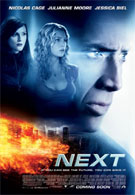Since the spectacle explosion of the 1980s blockbuster action movie, beginning with The Terminator and Die Hard, the genre has run the course of fresh and exciting to cliché and contrived. It seems that masked heroes sporting spandex have replaced muscling heroes with an endless supply of ammunition. These days, it’s a rare occasion to come across an action movie that doesn’t bore your brain and waste your time. Next does both. Perhaps it’s Cris Johnson's (Nicholas Cage) ability to see only two minutes into the future that explains why he doesn’t see the audience’s feelings of betrayal and disappointment coming.
Veiled by a sleazy Las Vegas club act, Johnson’s powers of future perception keep him one step ahead of the world. When he’s not on stage guessing people’s names and performing dime store magic tricks, he spends his days supplementing his income by gambling and waiting in a diner for the love of his life – the only vision he has seen more than two minutes ahead of time. For whatever reason, FBI agent Callie Farris (Julianne Moore) is convinced that Johnson is the real deal and tries to enlist his help in defusing a nuclear bomb threat by French terrorists. But all Johnson wants to do is get to know his lady love, who, eventually walks into the diner right when he knew she would.
Next’s pre-Terminator 2 computer-generated effects are endlessly distracting, but the film’s greatest flaw is that it introduces ideas of destiny and determinism and the role (if any) of freewill yet doesn’t explore them. By being able to look into the future, Johnson is able to choose the best possible personal outcome, but as he explains, “every time you look at the future, you change it.” In seeing the future, it’s a given that Johnson will act to preserve his own existence and whatever interests him, which seemingly eliminates freewill.
Taking the loss of freewill idea even further, when Johnson is caught by the FBI and forced to help, his individual rights are trampled on in favor of the many who could die in a nuclear explosion. It’s funny that the strength of our political system places the power in the individual and collective “we,” but we are quick to forfeit our rights in service of the “greater good”. It’s a slippery slope that could lead to a unified loss of all individual rights to preserve our own lives.
Unfortunately, these are topics that the movie barely mentions. It’s more concerned with fancy future fast-forwarding effects and twisting what happens next. The problem is that when the major dramatic twist happens, there is no thematic substance to hold onto and you suddenly realize that you’ve just wasted 2 hours and $10+ on a gimmick. Had the move delved into some sort of subtext and offered something in the way of thematic substance, then the deal-breaker twist wouldn’t be so empty. Instead, Next is a great example of an action movie light show – quick, meaningless and not worth remembering.
Your Daily Blend of Entertainment News

